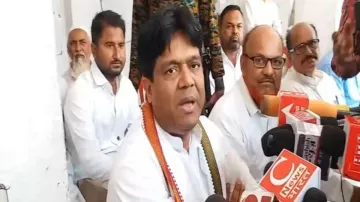'Nitish Kumar has already made it clear...': JDU leader asserts CAA won't be implemented in Bihar
JDU leader Khalid Anwar claimed that Nitish Kumar has firmly rejected the implementation of the Citizenship Amendment Act (CAA) in Bihar.

Citizenship Amendment Act: Contrary to the official stance of the BJP-led National Democratic Alliance (NDA) regarding the Citizenship Amendment Act (CAA), Janata Dal (United) leader Khalid Anwar asserted that the law, which ensures permanent residency for persecuted religious minorities in Pakistan, Afghanistan, and Bangladesh, will not be implemented in Bihar.
The statement holds importance as the JD(U) is a key ally of the BJP and other partners within the ruling NDA coalition in the state.
The rules for implementation of the contentious Citizenship (Amendment) Act (CAA) 2019 were notified by the BJP-led National Democratic Alliance (NDA) at the Centre on March 11, four years after being passed, thus paving the way for granting citizenship to undocumented non-Muslim migrants from Pakistan, Bangladesh and Afghanistan.
Here's what JDU leader say on CAA implementation
Speaking to reporters on Sunday, the JDU leader claimed that party chief and Chief Minister Nitish Kumar, who rejoined the NDA earlier this year after breaking ties from the Mahagathbandhan in the state, has firmly declined to implement the citizenship law in Bihar.
"The CAA will not be implemented in Bihar. Chief Minister Nitish Kumar has already made it clear that all 13 crore residents in the state are Biharis and there is no need for the CAA, NRC (National Register of Citizens) or NPR (National Population Register) here. As long as Nitish-ji remains in power, no one needs to worry about the CAA," Anwar told reporters at a press conference in Motihari.
To support his stance that the implementation of the CAA in Bihar was unnecessary, the minority leader referenced a resolution passed by the previous Nitish Kumar-led government in the Assembly. The resolution stated that neither the NRC nor the NPR would be implemented in the state.
"I would like to reiterate that as long as Nitish Kumar is in power, no one from Bihar, irrespective of their religion, will be deprived of their citizenship. During the previous government, we passed a resolution in the Assembly that there is no need for NPR or NRC in Bihar and such laws will not be implemented here," Anwar said.
His statement has the potential to cause discord within the ruling NDA, as it highlights a significant difference in opinion between CM Nitish and his coalition partners, particularly the BJP, regarding the implementation of a critical piece of legislation.
Amit Shah on CAA
Union Home Minister Amit Shah has stressed that the Citizenship Amendment Act will never be taken back and the Centre will not compromise on the sovereign right to ensure Indian citizenship in the country. Shah’s remarks came days after the government notified the rules of the CAA, in the fulfilment of its poll promise made in the 2019 Lok Sabha election manifesto.
In an interview to news agency ANI, the Home Minister said that it is impossible to repeal the law and that the government will spread awareness about it among the public.
Asked about the opposition INDIA bloc, specifically a Congress leader stating that they would repeal the law when they will come to power, the Home Minister said that even the opposition is aware it has bleak chances of coming to power.
"Even the INDI alliance knows that it will not come into power. CAA has been brought by the BJP party, and the Narendra Modi-led government has brought it. It is impossible to repeal it. We will spread awareness about it in the whole nation so that those who want to repeal it do not get a place," Shah said.
CAA rules
The Union Home Ministry officially notified the rules for the implementation of the Citizenship Amendment Act (CAA) on Monday, a move anticipated ahead of the impending Lok Sabha election schedule announcement.
The rules, formulated by the Narendra Modi government and passed by Parliament in 2019, aim to grant Indian citizenship to persecuted non-Muslim migrants from Bangladesh, Pakistan, and Afghanistan who arrived in India before December 31, 2014. Eligible communities include Hindus, Sikhs, Jains, Buddhists, Parsis, and Christians.
The rules also state that the applicants will have to provide an eligibility certificate issued by a locally reputed community institution confirming that he/she belongs to "Hindu/ Sikh/ Buddhist/ Jain/ Parsi/ Christian community and continues to be a member of the above mentioned community.
The applicants will also have to give a declaration that they "irrevocably" renounce the existing citizenship and that they want to make "India as permanent home", according to the rules.
(With agencies input)
Also Read: AIMIM president Asaduddin Owaisi moves Supreme Court over implementation of CAA